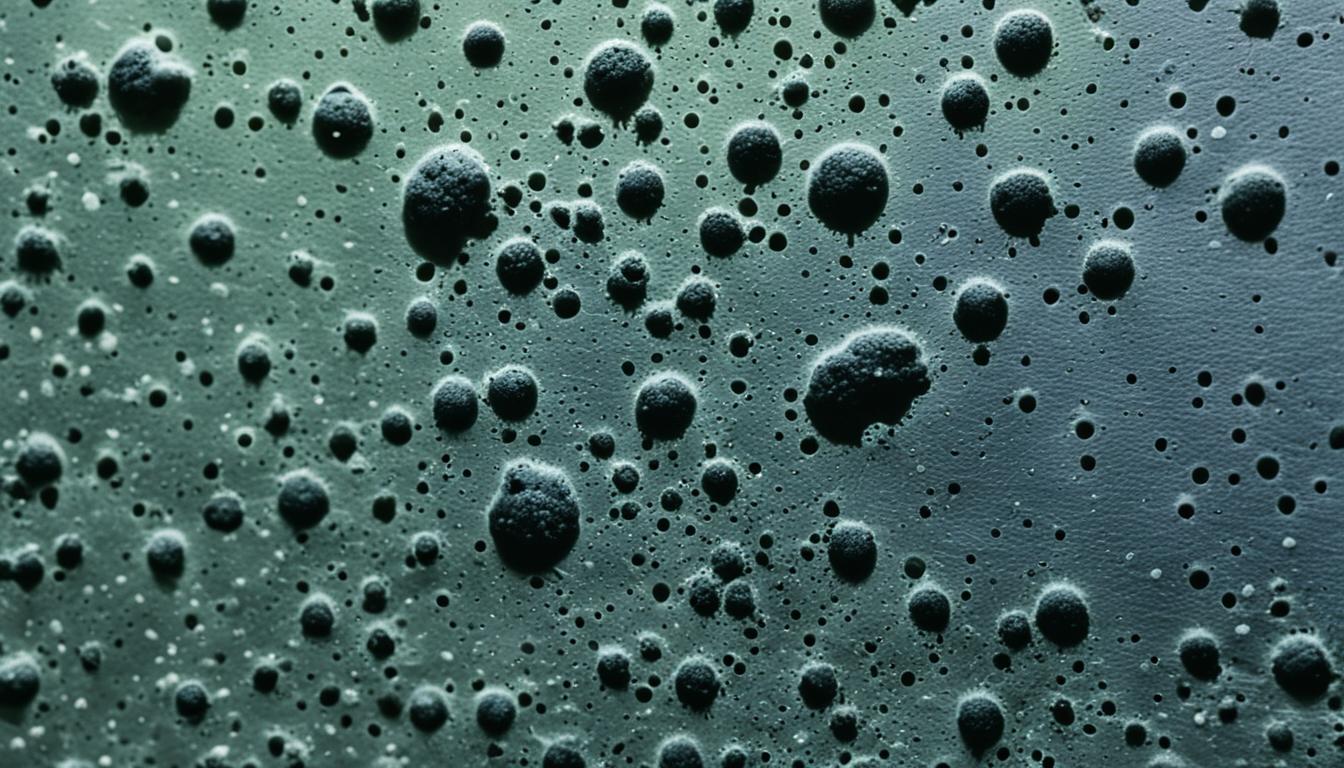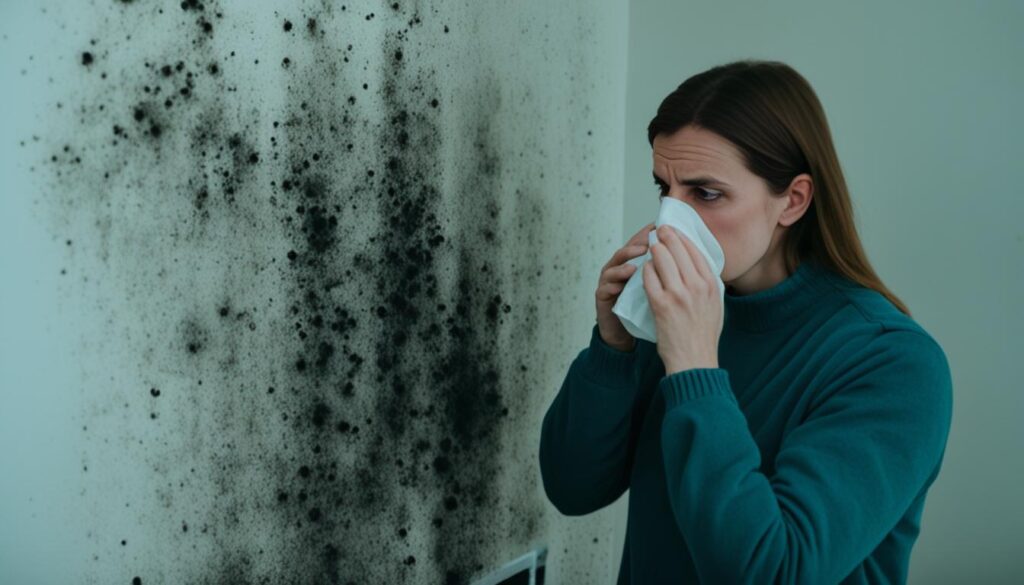
Unlocking the Mystery of does black Mold smell: What You Need to Know
Discovering mold in your home can be a cause for concern. Not only can it affect the structural integrity of your house, but it can also pose risks to your health and well-being. But, does black mold really have a distinct smell? In this article, we’ll delve into the truth behind the odor of black mold and why it’s important to understand its implications.
Key Takeaways:
- Black mold doesn’t always emit a noticeable smell.
- Reliance on smell alone is not enough to identify mold growth.
- Black mold odor comes from the release of volatile organic compounds (VOCs).
- Mold exposure can lead to respiratory problems and other health issues.
- Professional assessments and remediation are crucial in addressing mold problems.
The Truth About Black Mold Odor
When it comes to black mold, there’s a common belief that it gives off a strong and musty smell. While this may be true in some cases, it’s important to understand that not all mold types produce a noticeable odor. The smell of black mold can vary, and individuals may have different sensitivities to it.
The presence of a smell should not be the sole determinant of mold growth. Visual signs such as dark spots or fuzzy patches on walls, ceilings, or other surfaces are more reliable indicators of mold infestation. If you suspect the presence of black mold, it’s crucial to rely on professional assessments to accurately identify and address the issue.
However, it’s worth noting that in certain instances, black mold does emit a distinct odor that some people describe as musty, earthy, or even damp and rotten. This odor is typically caused by the release of volatile organic compounds (VOCs) that black mold produces during its growth and reproduction.
It’s essential to be aware of the potential health risks associated with mold exposure. Inhaling mold spores, including those emitted by black mold, can trigger allergic reactions and respiratory problems in some individuals. People with allergies, asthma, or weakened immune systems are particularly susceptible to the adverse effects of mold. Symptoms may include coughing, sneezing, wheezing, nasal congestion, throat irritation, headaches, fatigue, and skin rashes.
It is important to take mold issues seriously and address them promptly to protect the health and safety of your household. Although the presence of a mold odor can be a cause for concern, it should not be the sole basis for action. Consult with a qualified professional to assess the extent of the mold problem and determine the appropriate remediation measures.
“The presence of a mold odor should not be ignored, but it needs to be corroborated with visual evidence and professional assessments to make an accurate determination.”
Why Does Black Mold Produce an Odor?
Black mold, scientifically known as Stachybotrys chartarum, releases volatile organic compounds (VOCs) as part of its metabolic processes. These compounds are responsible for the distinct smell often associated with mold growth. VOCs can have a strong and unpleasant odor, ranging from musty and earthy to stale and putrid.
The production of VOCs by black mold serves various purposes. Some compounds help attract insects to spread the mold spores, while others protect the mold from competing microorganisms.

Effects of Black Mold Odor
When black mold is present in your home, it can release volatile organic compounds (VOCs) that contribute to the distinctive smell often associated with mold growth. Inhaling these VOCs can lead to various health issues, especially for individuals with allergies, asthma, or weakened immune systems.
- Respiratory problems: Mold exposure can cause or worsen respiratory problems such as coughing, wheezing, and shortness of breath.
- Allergic reactions: People with mold allergies can experience allergic reactions such as sneezing, itching, watery eyes, and skin rashes.
- Headaches and fatigue: Exposure to mold can result in frequent headaches and fatigue, affecting daily productivity and well-being.
In more severe cases, mold exposure can lead to serious health complications, including:
- Severe respiratory infections
- Lung diseases
- Neurological problems
- Organ damage
- Exacerbation of existing health conditions
Therefore, it is crucial to address any mold issues promptly to protect the health and safety of your household. Seeking professional assistance for mold remediation and taking preventive measures can help minimize the risks associated with mold exposure.
“Mold-related health problems can range from mild irritations to chronic conditions. It’s essential to prioritize mold prevention and remediation to safeguard your family’s well-being.”

| Health Risks | Symptoms |
|---|---|
| Allergies | Sneezing, itching, watery eyes, skin rashes |
| Asthma | Coughing, wheezing, shortness of breath |
| Respiratory infections | Severe coughing, fever, chest pain |
| Lung diseases | Chronic bronchitis, respiratory failure |
| Neurological problems | Headaches, memory loss, confusion |
| Organ damage | Liver, kidney, or immune system dysfunction |
Conclusion
Understanding whether black mold emits a noticeable odor is crucial when it comes to identifying and addressing mold growth. While some individuals may detect a distinct smell from black mold, it is not a reliable indicator of its presence. Therefore, it is important to rely on professional mold assessments, visual inspections, and appropriate remediation processes to effectively deal with any mold issues in your home.
When dealing with mold, it is essential to prioritize the health and safety of your household. Black mold can release volatile organic compounds (VOCs) that contribute to the characteristic odor of mold growth. Inhaling these VOCs can lead to various health problems, especially for those with allergies, asthma, or weakened immune systems. Symptoms of mold exposure may include respiratory issues, allergic reactions, headaches, fatigue, and more severe complications in some cases.
If you suspect mold growth in your home, it is recommended to contact a professional mold assessment and remediation service. Fix Mold Miami offers comprehensive mold assessments and reliable remediation services. To schedule a mold assessment or seek assistance with mold issues, reach out to Fix Mold Miami at 305-465-6653.




